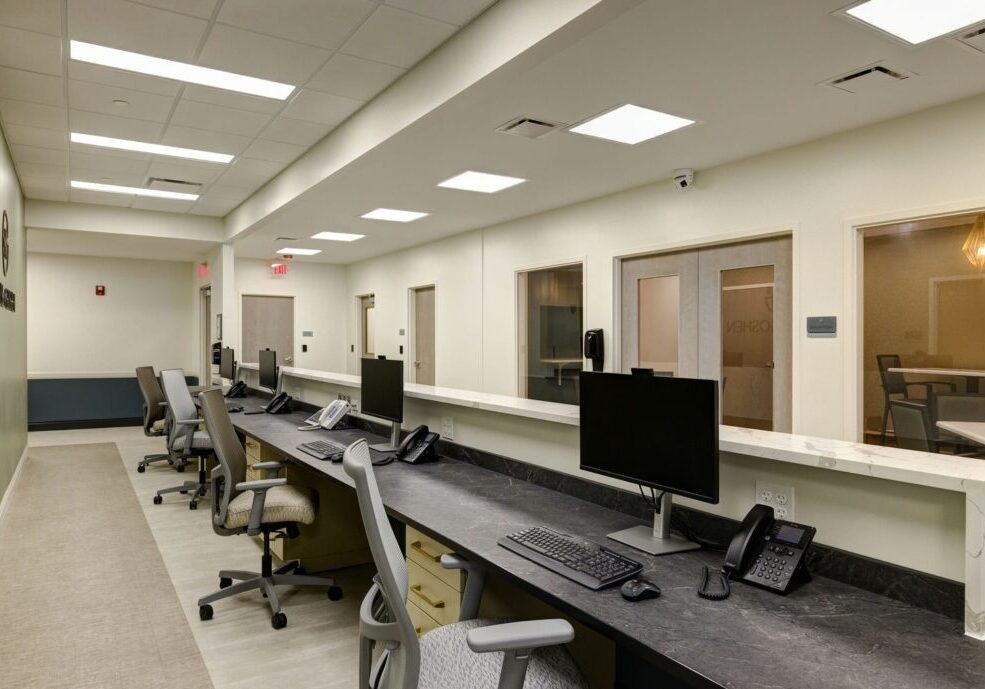
Finding an ambulatory surgery center (ASC) property that facilitates operational excellence, patient comfort, and safety requires careful thought, planning and strategy. Whether you are moving an existing ASC or establishing a new practice, your property significantly impacts patient care, staff recruitment/retention, and your facility’s success.
Here we share the most important factors to consider when acquiring your ASC property.
Financials
Your property must meet the needs of your patients while helping you improve profitability.
Performing a lease versus buy analysis will provide insights into how owning or leasing your ASC property financially impacts the short- and long-term development of your business. Generally, owning the space provides an asset with less overall expense but can make expansion more difficult. A lease on the other hand, usually provides more cash flow and flexibility for easier expansion but does not build a business asset.
Other financial considerations include:
- Tax implications of ownership which might offer more tax deductions
- Maintenance costs covered by a landlord versus your business as a property owner
- Flexibility to accommodate the changes of a growing practice
- Options that help minimize operational costs
- Upfront capital expenditure required
The Right Approach
Whether buying or selling, there are typically three approaches used to help find a suitable space:
- Working with a real estate agent who knows the market helps ensure your investment reflects what the area demands for similar spaces. However, an agent might not have the experience to find suitable ASC options.
- Doing your own legwork researching three to four similar commercial spaces can help you understand the average lease or selling price in your area. However, you might lack the vision to identify feasible ASC opportunities.
- Working with a design-build expert specializing in sourcing cost-effective ASC properties provides the vision to identify opportunities, customize the space to suit your needs and adhere to regulatory requirements.
Required Square Footage
When deciding on the size of your location you need to factor in space allocation for private areas for treatment and staff, and public space such as lobbies/waiting rooms, hallways, and bathrooms. Other considerations include mechanical areas, storage, size of medical equipment, etc. and whether you need a scalable space for expansion.
Location
This is the most important factor as it determines your ability to not only serve your patients, but also attract and retain staff. Even something as simple as a 15 minute longer drive from the city center to your ASC can keep people from choosing your services or applying for a job at your facility.
Location essentials include:
- Local competition and opportunities
- Local patient demographics aligned with your ideal patient profile
- Site parking
- Accessibility
- Community health services and providers to generate referrals
- General area safety
Lease Terms
If leasing, it’s essential to review the lease terms for the following:
Lease type
Lease types include:
- Gross leases: This is a flat rate lease that puts the onus for operating expenses, taxes, building insurance and repairs on the landlord.
- Net leases: Requires the tenant to pay some or all taxes.
- Net-net lease: The tenant pays the base rent, taxes, and insurance.
- Net-net-net or “triple net” lease: The tenant pays all costs including operating costs, repairs, and maintenance.
Rent increases & renewal
Watch for escalation clauses in a lease agreement to understand what rent increases are expected or allowed. Also, if possible, look for the option to guarantee renewal in your space when the lease expires. Without guaranteed renewal you might encounter a major business disruption if the landlord is not willing to renew.
Sub-leasing
Sub-leasing clauses impact your ability to move mid-lease whether it’s due to expansion, business failure or lack of suitability of the space. In some cases, you might be challenged to find tenants based on landlord approval or be responsible to cover rent should your sub-tenant default on payments.
Improvements
Provisions for improvements, what the landlord is willing to provide and agreements regarding renovations should all be put in writing. If the landlord is overseeing renovations prior to move-in, you want the following:
- A detailed plan
- Cost estimate
- Move-in date
- Accommodations if completion dates aren’t met
- Special requirements
Specialty Systems
ASC’s require infrastructures that support specialty systems from high performance HVAC systems to emergency/isolated power and piped medical gases to sterilization facilities. Considering whether the space can accommodate these needs, how they impact price and how they work with further controls and functional considerations such as high-performance hygienic materials will ensure you can create a patient-centric, efficient environment.
Finding the right property will help ensure you balance cost effectiveness with patient’s needs, accommodating the services provided and attracting the level of caregivers and administrators that contribute to your success.
Bring your ASC facility vision to life with Apex
Your ASC facility design and build project must align with patient needs while delivering optimum efficiency and compliance. Apex is your design build partner offering architecture, design and build capabilities using a proven integrated methodology, bringing your vision to reality using the highest standards possible.
